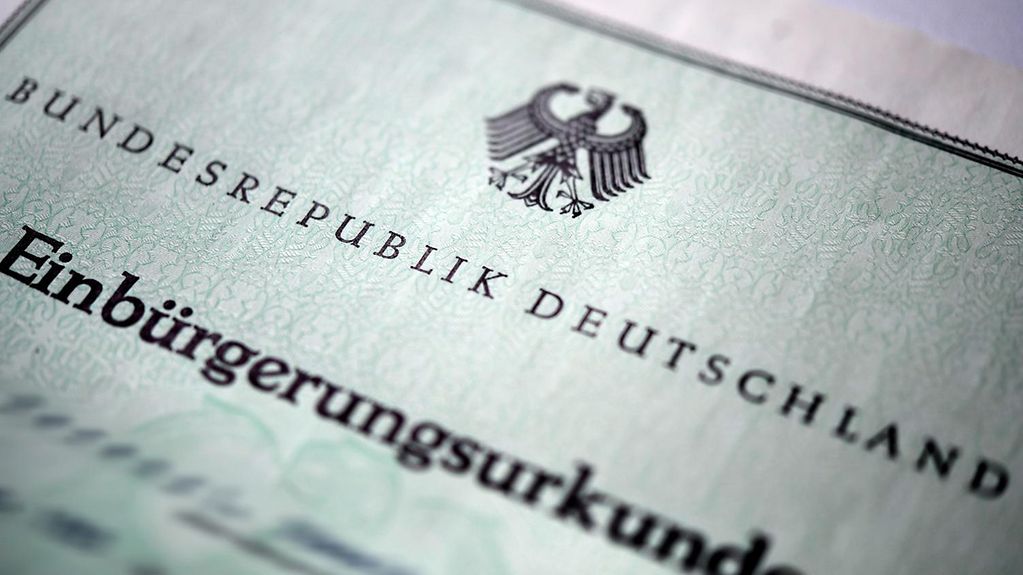Modern citizenship law
The Bundestag has now approved a modernisation of citizenship law. Federal Chancellor Scholz stated: “With this new citizenship law we are sending a clear message to all those who’ve been living and working in Germany, in many cases for decades, and who are following our laws and are at home here: you are a part of Germany!” Read on to find out about the key points of the reform.
3 Min. Lesedauer

Acquiring German citizenship reflects a strong commitment to Germany.
Foto: picture alliance / Laci Perenyi
Some 14 percent of people living in Germany do not have a German passport, this is around twelve million people, about 5.3 million of whom have been living in Germany for at least ten years. Only some of those eligible are currently seeking citizenship. 168,545 individuals applied for a German passport in 2022, for example, only 3.1 percent of the foreign nationals who have been living here for at least ten years. At 1.1 percent, the naturalisation rate in Germany is below the EU average of 2.0 percent. The draft law for modernising citizenship law is designed to change this.
Federal Minister of the Interior Nancy Faeser believes that acquiring citizenship promotes and speeds up integration across many areas. “By taking this step, people demonstrate that they identify with our country, our democracy and our values,” Faeser said.
Key points of the reform
- The Federal Government plans to implement a long-overdue paradigm shift by allowing multiple citizenship. Acquiring German citizenship reflects a strong commitment to Germany. Many immigrants consider themselves German, but do not wish to fully sever their ties to their country of origin. In future, they will no longer be required to give up a part of their identity.
- The draft law seeks to provide incentives for integration, rather than creating obstacles and requiring people to have lived in Germany for a very long time. The required period of residence in Germany is to be decreased from eight to five years, or even to three years for individuals who have achieved an outstanding level of integration.
- Children born in Germany to non-German parents are automatically granted German citizenship if one parent has been legally living in Germany for more than five years with unlimited residency status. This is because studies have shown that the education prospects of children and teenagers with a migration background are better, the sooner they were granted German citizenship.
- Former guest workers will only need to demonstrate oral language proficiency in future, and they will no longer be required to take a naturalisation test. By taking this step, the Federal Government seeks to acknowledge the lifelong achievements of the so-called guest worker generation in our country. In cases of particular hardship, the German language requirement may be reduced to demonstrating oral proficiency alone.
- The requirement of having adapted to the living environment in Germany is to be replaced with specific grounds for exclusion. Reasons for exclusion from naturalisation include polygamy and disregard for gender equality.
- It is clearly established that anti-Semitism, racism and other forms of disrespect for human beings are incompatible with the guarantee of human dignity enshrined in the Basic Law, and are grounds for exclusion from the option to acquire citizenship.
- The security clearance process is to be digitalised and accelerated. At the same time, the list of authorities from which clearance is sought has been expanded to include those security agencies that are also involved in the participation procedures under residence and refugee law.
Which changes were adopted in the Bundestag?
The Federal Government’s draft law was amended or supplemented by means of the parliamentary procedure. A summary.
- The requirements for naturalisation have been extended to include commitment to Germany’s particular historic responsibility for the National Socialist dictatorship and its consequences, and in particular the protection of Jewish life and peaceful coexistence of nations, as well as the ban on offensive warfare (§10(1)(1)(1a) of the modernisation of citizenship law “StARModG”).
- Naturalisation is ruled out if the commitment pursuant to §10(1)(1)(1a) StARModG and the commitment to the free democratic order and declaration of loyalty are inaccurate.
- The rules for former guest workers will also apply to spouses of guest workers and contract workers who subsequently joined their spouses in Germany.
- The law is to enter into effect three months after its promulgation.